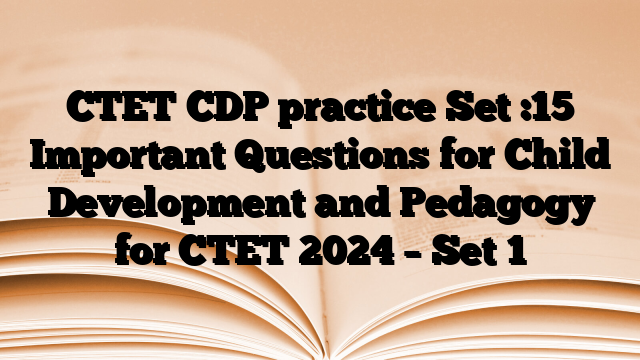CTET CDP practice Set : Child development and pedagogy are two important fields of study that address the growth and learning of children. Child development focuses on the physical, cognitive, social, and emotional changes that children experience from birth to adulthood. Pedagogy, on the other hand, is the study of teaching and learning methods.
15 Important Questions
1. What is the primary focus of developmental psychology in relation to education?
- A) Teaching methods
- B) Cognitive processes
- C) Physical growth
- D) Social interactions
Answer: B) Cognitive processes
Explanation: Developmental psychology focuses on understanding how cognitive processes, such as memory, language, and problem-solving, evolve over time.
2. According to Piaget’s stages of cognitive development, which stage occurs during infancy (0-2 years)?
- A) Sensorimotor
- B) Preoperational
- C) Concrete operational
- D) Formal operational
Answer: A) Sensorimotor
Explanation: The sensorimotor stage is characterized by sensory experiences and motor actions, typical of infants.
3. What is the key concept in Vygotsky’s sociocultural theory of development?
- A) Stages of development
- B) Zone of proximal development (ZPD)
- C) Critical periods
- D) Emotional intelligence
Answer: B) Zone of proximal development (ZPD)
Explanation: Vygotsky’s theory emphasizes the importance of the ZPD, the range of tasks a child can perform with help, but not alone.
4. Which domain of development involves the ability to control and coordinate body movements?
- A) Cognitive development
- B) Emotional development
- C) Physical development
- D) Social development
Answer: C) Physical development
Explanation: Physical development involves motor skills and coordination of bodily movements.
5. Erik Erikson’s theory of psychosocial development includes how many stages?
- A) 5
- B) 6
- C) 8
- D) 10
Answer: C) 8
Explanation: Erikson identified eight stages of psychosocial development, each associated with a specific conflict or challenge.
6. According to Maslow’s hierarchy of needs, which needs must be satisfied before higher-level needs can be addressed?
- A) Physiological needs
- B) Safety needs
- C) Esteem needs
- D) Self-actualization needs
Answer: A) Physiological needs
Explanation: Maslow’s hierarchy suggests that lower-level needs must be met before higher-level needs can be fulfilled.
7. What is the role of the amygdala in emotional development?
- A) Memory formation
- B) Emotional regulation
- C) Language development
- D) Socialization
Answer: B) Emotional regulation
Explanation: The amygdala plays a key role in processing emotions and emotional regulation.
8. In behaviorist theory, what is the process of gradually shaping behavior through reinforcement called?
- A) Classical conditioning
- B) Operant conditioning
- C) Observational learning
- D) Social learning
Answer: B) Operant conditioning
Explanation: Operant conditioning involves reinforcing desired behaviors to shape them over time.
9. What is the main emphasis of Howard Gardner’s theory of multiple intelligences?
- A) IQ testing
- B) Emotional intelligence
- C) Diversity of human intelligence
- D) Cognitive development
Answer: C) Diversity of human intelligence
Explanation: Gardner proposed that intelligence is not a single trait but a variety of abilities, including linguistic, musical, and interpersonal.
10. According to Kohlberg’s stages of moral development, which stage is characterized by adherence to social norms and authority figures?
- A) Preconventional
- B) Conventional
- C) Postconventional
- D) Unconventional
Answer: B) Conventional
Explanation: In the conventional stage, individuals value conformity and follow societal rules and expectations.
12. Which theorist is associated with the concept of the “self” and its development?
- A) Jean Piaget
- B) Erik Erikson
- C) Lev Vygotsky
- D) Carl Rogers
Answer: D) Carl Rogers
Explanation: Carl Rogers emphasized the development of the self-concept and self-esteem.
13. What is the primary focus of Lev Vygotsky’s sociocultural theory?
- A) Individual learning
- B) Social interactions
- C) Emotional development
- D) Biological factors
Answer: B) Social interactions
Explanation: Vygotsky emphasized the role of social interactions in cognitive development.
14. According to Erik Erikson, what is the main psychosocial challenge of adolescence?
- A) Trust vs. Mistrust
- B) Autonomy vs. Shame
- C) Identity vs. Role Confusion
- D) Generativity vs. Stagnation
Answer: C) Identity vs. Role Confusion
Explanation: Adolescents face the challenge of forming a coherent identity.
15. Which of the following is an example of a fine motor skill?
- A) Running
- B) Jumping
- C) Writing
- D) Kicking
Answer: C) Writing
Explanation: Fine motor skills involve small muscle movements, such as those used in writing.

